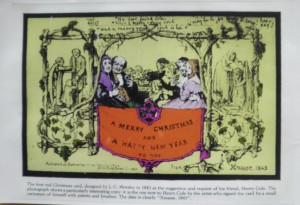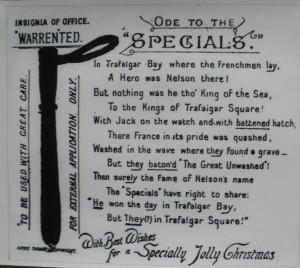’Tis the Season to Protest
Article published: Thursday, December 9th 2010
From its humble origins in the 1840s to the mass-produced, indispensable form of seasonal greeting that it has become nowadays, we think of the christmas card as the messenger of religious and peaceful missives. But it also has a tradition of conveying political messages and protest, as an exhibition at the People’s History Museum shows.
‘Political’ is perhaps not the first word that comes to mind when one considers the Christmas card. A quick scan of the cards displayed in the local supermarket reveals the usual Christmas clichés: jolly red-nosed Santas (who have, perhaps, consumed a little too much brandy); and ever-smiling, all singing, all dancing Christmas elves (who never seem to complain about seasonal overtime).
The political character of Christmas cards has traditionally been overlooked, claims Andy Pearce, deputy director of the People’s History Museum. Politics, Protest, and the Christmas Card, the latest exhibition in the People’s History Museum ‘Community Gallery’, seeks to redress this balance. Curated by the former Labour MP Llew Smith and his late wife Pam, the exhibition traces the evolution of political Christmas cards from the 1840s to the present day. Collected by the couple over a thirty-five year period, the exhibited cards subvert traditional Christmas themes in order to highlight political and social injustice, both past and present.
Since their origins in the 1840s, Christmas cards have provided a valuable insight into social mores and political thought. The first mass-produced card, designed by Henry Cole in 1843, depicted a vast gulf between rich and poor, inadvertently highlighting the extreme social stratification of Victorian England. The artist portrays a wealthy family drinking wine in the card’s colourful centre, while he places the downtrodden poor around its cold, grey edges.
As the nineteenth century progressed, artists began to realise the political potential of Christmas cards. On ‘Bloody Sunday’ in the winter of 1887, protesters demonstrating against coercion in Ireland were brutally beaten by police – killing some and wounding others. A card commemorating this event features a drawing of a police truncheon. ‘To be used with great care’, reads the caption. This Christmas card imparts a lesson from history which, if we look closely enough, still resonates today.
A slightly more recent card shows Nick Clegg dressed in a Santa suit while a young, discontented-looking child sits on his knee. ‘But Santa’, reads the caption, ‘this isn’t what I asked for. And it isn’t what you promised!’. In the background, a smiling Cameron gives the invisible audience a smug thumbs-up.
A series of cards relating to the Israel-Palestine conflict subvert traditional conceptions of the nativity to highlight the injustices faced by Palestinians. ‘Is that the star of Bethlehem’, demand the wise men in one card, ‘or another Israeli missile?’ Another portrays Joseph, and a heavily pregnant Mary, detained and searched by heavily armed soldiers at an Israeli roadblock. A sign points meaningfully towards Bethlehem, but it is clear that the young couple will be going nowhere in a hurry.
The exhibited cards provide us with a window into the social and political struggles of the past. ‘We forget our history at our peril,’ warned CND campaigner Bruce Kent as he opened the exhibition on Friday. Indeed, for Smith it is the very knowledge of these struggles which provides us with hope for the future. An understanding and appreciation of the successes and failures of the past, he argues, will prepare us for the future. ‘We will go forward’, he asserts, ‘and we will go forward with strength’.
Refreshing, engaging, and genuinely thought provoking, this exhibition is well worth a visit.
Robin Macdonald
Politics, Protest, and the Christmas card is running at the People’s History Museum until January 6 2011.
More: Culture, Exhibition
Comments
-
You can buy some very topical cards from Red Pepper Magazine.
Comment by dave on December 10, 2010 at 9:45 am
The comments are closed.





